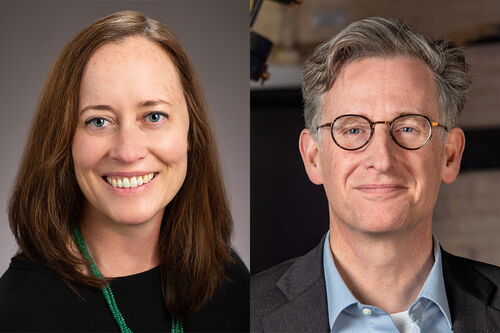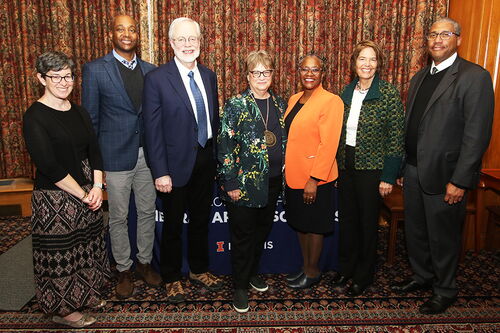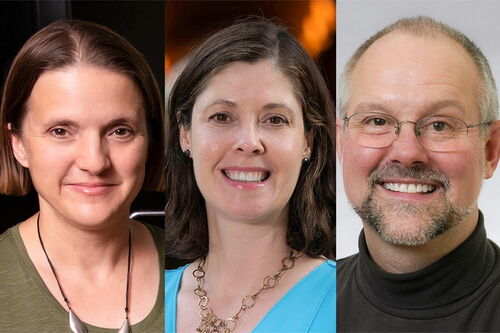Making room for ideas and innovation
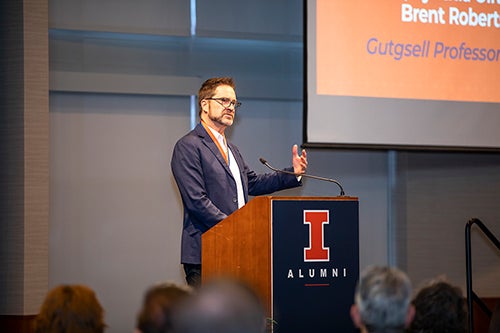
In January the University of Illinois announced that five College of LAS faculty members have been named university endowed chairs or professors, an honor awarded to highly distinguished scholars for excellence in research, teaching, and service. We asked each of them to describe how the honors affect their work and careers.
Pursuing projects with greater flexibility
English professor Christopher Freeburg was selected as the inaugural Presidential Humanities and Social Sciences Endowed Chair. Freeburg is the former John A. and Grace W. Nicholson Professor of Liberal Arts and Sciences and has an appointment in the Unit for Criticism & Interpretive Theory. He is a distinguished critic of African American literature and culture.
While Freeburg’s interests in literature extend beyond campus, Freeburg said that being a professor has brought him a lot of joy. The work Freeburg has done and the passion he finds in teaching has been a part of his identity since he was young.
“I wanted to be a professor since I found out you could make a living teaching and writing about literature,” Freeburg said.
This endowment will help Freeburg further pursue potential scholarly projects with great flexibility due to further funding, he said. Freeburg’s most recent publication is “Counterlife: Slavery after Resistance and Social Death” and he’s currently finishing a book on Black culture that will be published by Yale University Press next year.
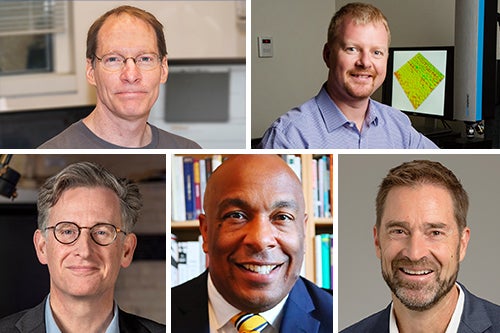
A greater understanding of black holes
Charles Gammie, a professor of astronomy and physics, was named Ikenberry Endowed Chair. The honor comes after much hard work within his department since 1999.
He recalled receiving the letter from the chancellor and the provost informing him of the endowment.
“I was at first completely floored and then very happy,” Gammie said. “It's a great honor to be recognized with a campus-level chair, and very special to have one named after (former university president) Stan Ikenberry, who is such a beloved figure around campus and around the state.”
In 2019, Gammie and a team of other scientists around the world took the first image of the supermassive black hole at the center of the Milky Way. Gammie plans to use this endowment to further his theoretical astrophysics research on black holes.
“The appointment funds can be used to start up high risk, high reward projects that would be difficult to obtain support for through the usual channels,” Gammie said. “One thing I plan to work on is building a case for putting an antenna in orbit around the Earth to make even higher resolution images, and movies, of black holes!”
Arriving at the big picture
James Imlay, professor of microbiology, has been named Swanlund Endowed Chair. He said that this recognition has acknowledged the significance of the problem that his lab studies.
“We have worked to understand how microbes struggle with the chemical injuries that oxygen produces,” he said. “Some microbes have evolved sufficient defenses that they can cope; others, including the majority of microbes in the human gut, cannot. Further, the immune responses of mammalian hosts, like ourselves, exploit this vulnerability by generating reactive oxygen species in order to fully suppress microbial infection.”
His research also examines how oxidative stress affects human fitness, particularly how it disrupts metabolism.
Imlay said that funding from the Swanlund Endowed Chair will help him reach his next research goal. “A grand challenge for us is to take an oxygen-sensitive bacterium and, by replacing its known vulnerabilities with oxygen-resistant enzymes, to try to convert it to an oxygen-resistant organism,” he said. “If we can do that, then we can pat ourselves on the back as having arrived at the big picture. If it doesn't work, then we are missing something and have to dig back in.”
A better understanding of ecosystems and water efficiency
Andrew Leakey, professor of plant biology, has been named the Michael Aiken Chair. He noted the significance of the award, named for former Illinois Chancellor Michael Aiken.
“I am grateful to be the latest beneficiary of that investment in our faculty,” Leakey said.
Leakey is an internationally recognized leader in genomic ecology and global change biology. His research explores agricultural ecosystems and plant water efficiency through studying plant biology, physiology, and photosynthesis. It includes manipulating the genetic makeup of plants through biotechnology and breeding to learn more about crops and improve food production.
Leakey’s research also looks specifically at plants in the context of global change, especially drought, and adapting to change. It helps understand and bring solutions to the worldwide issue of food insecurity.
“The named position will help me accomplish my career goals of developing crops that are more productive, sustainable and resilient in providing fuel, food, and other clean bio-based products,” Leakey said.
Funding student-led research
Brent Roberts, professor of psychology, has been named Gutgsell Endowed Professor. Praise is not always an easy thing to come by, he said, which made this honor feel like a big bear hug, he said. “Getting it is a huge acknowledgement from my colleagues here in psychology and from the university that they value my work,” Roberts said.
His research focuses mainly on how personality changes throughout adulthood. It also looks at personality assessment, specifically conscientiousness and narcissism.
With the support from the new appointment, Roberts has already been able to fund five studies that his students are working on. One study is being led by a first-year student, while the rest are dissertation theses for senior doctoral students.
“It will help us fund a number of important studies including the study of scientific creativity and a longitudinal study on the development of self-regulation,” said Roberts. “The Gutgsell monies can support innovative research that couldn’t get done otherwise.”






